Seventy years ago, it must have been difficult to imagine two cars more divergent than the Morgan Plus 4 and Land Rover Defender. But recently Morgan and Land Rover found themselves at the same crossroads: both were custodians of instantly recognisable and idiosyncratic English icons, but both cars had evolved glacially from post-war roots and were dated, cramped, not particularly safe in an accident and saddled with shaky ladder chassis and live axles that bucked and tremored at the merest suggestion of B-road. They drove as though possessed by the same gyrating Elvis, but thankfully both were to be reinvented with new aluminium chassis and independent suspension.
The new Defender you’ll surely know, the Plus Four quite possibly not, but nearly three quarters of a century after the release of Morgan’s core model, in 1950, the British firm has reengineered it so comprehensively that it claims just three per cent of parts carry over, and this might be a cautious estimate given those parts are actually bonnet latches. Even the name is subtly different, now written Plus Four in a change that mellows from seeming daft to perfect, because as much as things have changed with this Morgan, they haven’t changed at all.
In fact, the car looks identical, to the point that you doubt Morgan’s ‘all-new’ tag. Surely some body panels carry over? The mohair hood? The windscreen? Apparently they don’t. The front wings are super-formed aluminium rather than hand-formed, the door shuts follow the curve of the rear wheel arches for the first time, and while the overall dimensions are similar, the wheelbase is 20mm longer. Small details, wholesale change.
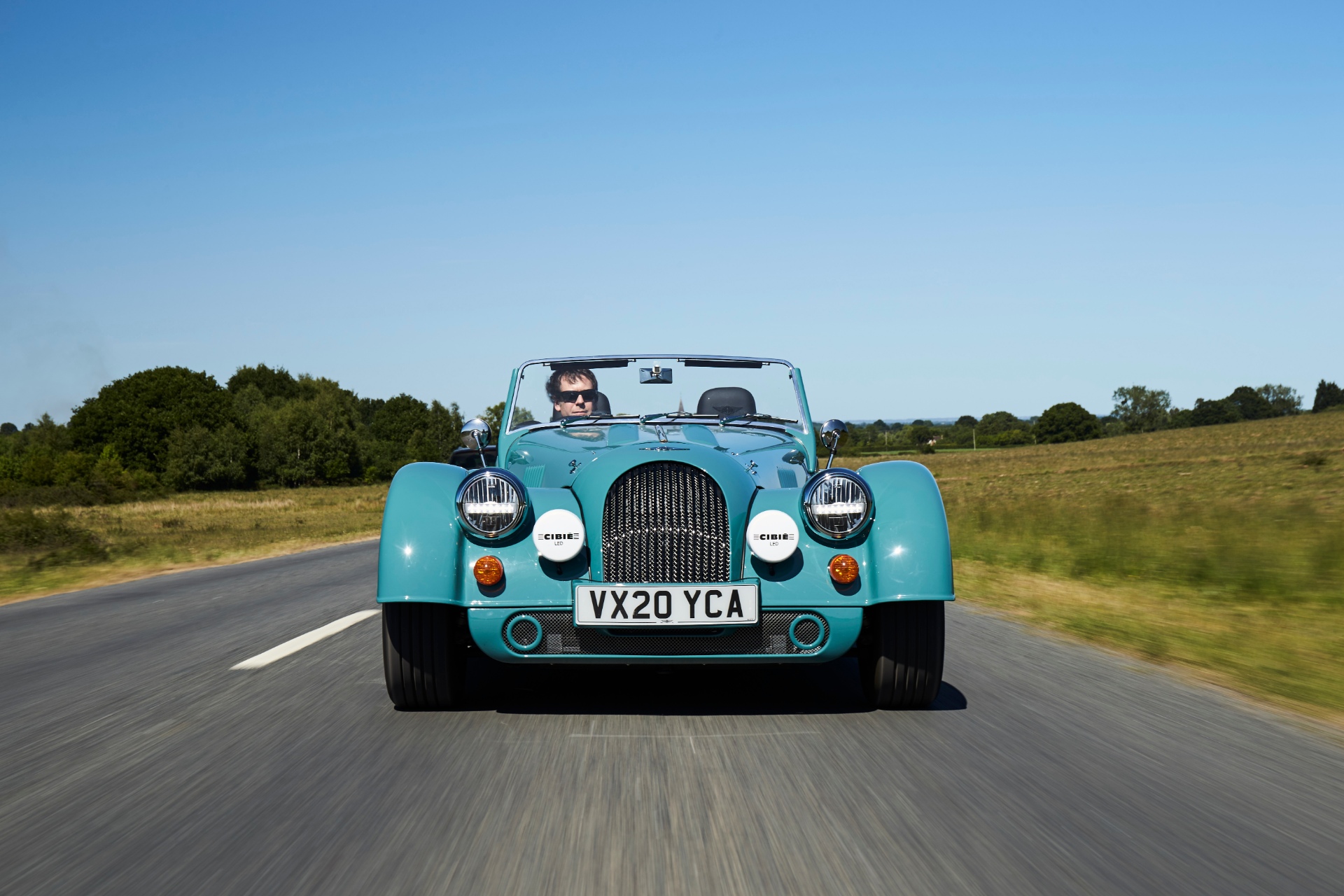
Touring Morgan’s red-brick factory buildings in Malvern – a sensory adventure that begins with the sweet smell of hot worked wood, then metallic swarf in the machining shop, and finally the rich aroma of Muirhead leather – you soon appreciate the depth of change.
It starts with a bonded aluminium chassis, built in Northampton and closely related to the wider CX-Generation chassis introduced in the larger, six-cylinder Plus Six in 2019. That was Morgan’s 110th year, or CX as the Romans had it.
To this chassis, Morgan attaches double wishbones all-round, made to a compact design that allows for deep-dished wire wheels, and manufactured on site. The old Ford GDI engine makes way for the BMW B48 2.0-litre (Morgan’s first turbocharged four-cylinder engine), and a choice of six-speed manual or ZF automatic transmissions. There is electric power steering, another Morgan first.

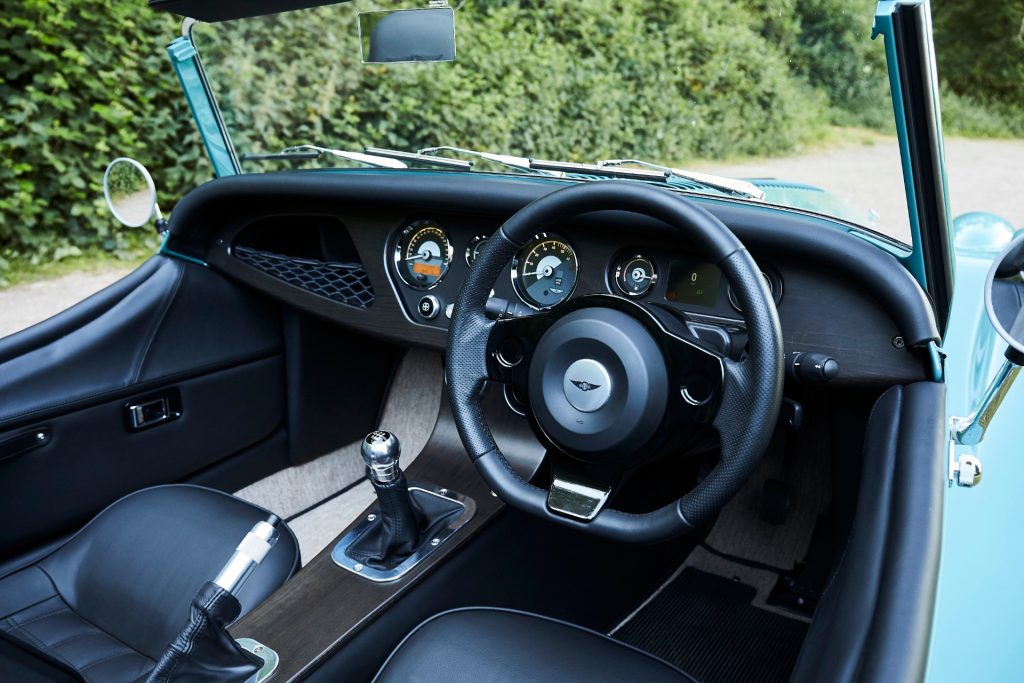
Yet a structural ash frame continues to be placed on top of the chassis, the wood sourced from Lincolnshire (the former Belgian supply was ditched; too much shrapnel, sorry chaps) and around which aluminium panels are hand-formed. There is ABS, yet still no airbags or stability control. Morgans are of course still hand-assembled (at a rate of around 900 annually), and there’s still a waiting list, though typically three to six months these days, not the decade of the 1980s, during which period some patient customers would actually die. Talking of which, if your old ticker isn’t what it was, you’d best sit down for the price, which rises from £48k to £62,995. But then neither is a pint a shilling these days.
Hop between old and new and already you notice one big advantage of the CX chassis – there’s bags more room to slide the low and flat driver’s seat back, even for six footers, and wider door apertures make climbing aboard less like stepping through a hula hoop.
Like outside, the Plus Four appears near identical inside – the speedo and rev counter are frustratingly out of the driver’s line of sight in the middle of the dash, petrol gauge and water temp dead ahead – but changes include a conventional handbrake (not fly-off) and a small digital read-out that at last puts mph somewhere ahead of the steering wheel.
The BMW four settles to a purposeful, bassy idle, the clutch is friendlier than its heft initially suggests, first gear slots lightly if precisely and soon we’re turning heads and climbing the Malvern Hills. The difference to an old ladder chassis car takes metres rather than miles to appreciate. The new model doesn’t shudder or shake, it rides over potholes far more serenely and overwhelmingly this feels the more composed machine. It’s not perfect, there’s still the occasional undamped thud over transverse ridges and it can bobble over imperfections, particularly at low speeds, but this is a multi-generational leap in one single step. Already you feel encouraged to be liberal with the accelerator, especially as there’s annoying wind whistle at middling speeds.
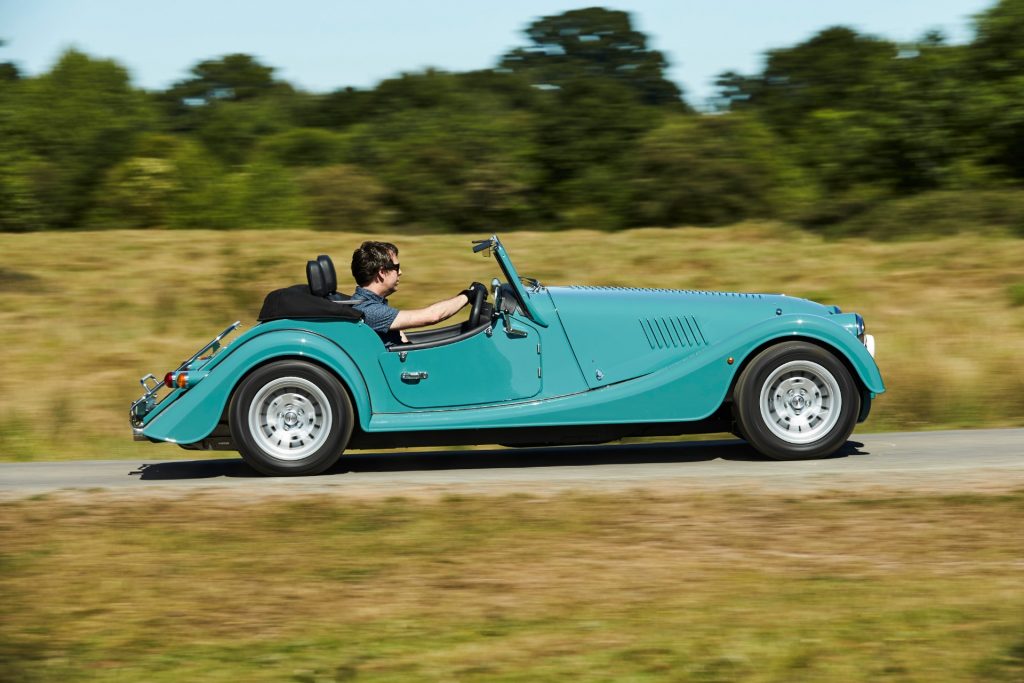
BMW helped calibrate its 2.0-litre engine to suit this 1013kg (without fluids, around 80kg heftier than before) sports car. There’s a tiny pause of turbo lag, but throttle response is very prompt and the lack of mass means the Plus Four bursts forward with true urgency: easy in the mid-range courtesy of an ample 295lb ft of torque, downright rapid when you work it harder thanks to 255bhp (both figures well up on the Ford motor’s 154bhp/148lb ft). Like a young athlete disguised in pensioner fatigues, this speed seems out of kilter with expectations and figures of 0-62mph in 4.8sec (or 5.2sec in the manual) and 149mph back up your gut feel.
Stripped of a series-production car’s heft and soundproofing (and given full voice by an optional sports exhaust), the powerplant also bustles with mechanical chatter, a bassy simmer through the mid-range, subtle pops on the overrun, even Darth Vader exhalations of turbocharger when you lift the throttle. You fear it might sound inauthentic, but it suits this Mog, and the nicely spaced pedals and snicky manual gear shift encourage you to indulge the tunes with flourishes of heel-and-toe and playful throttle blips.
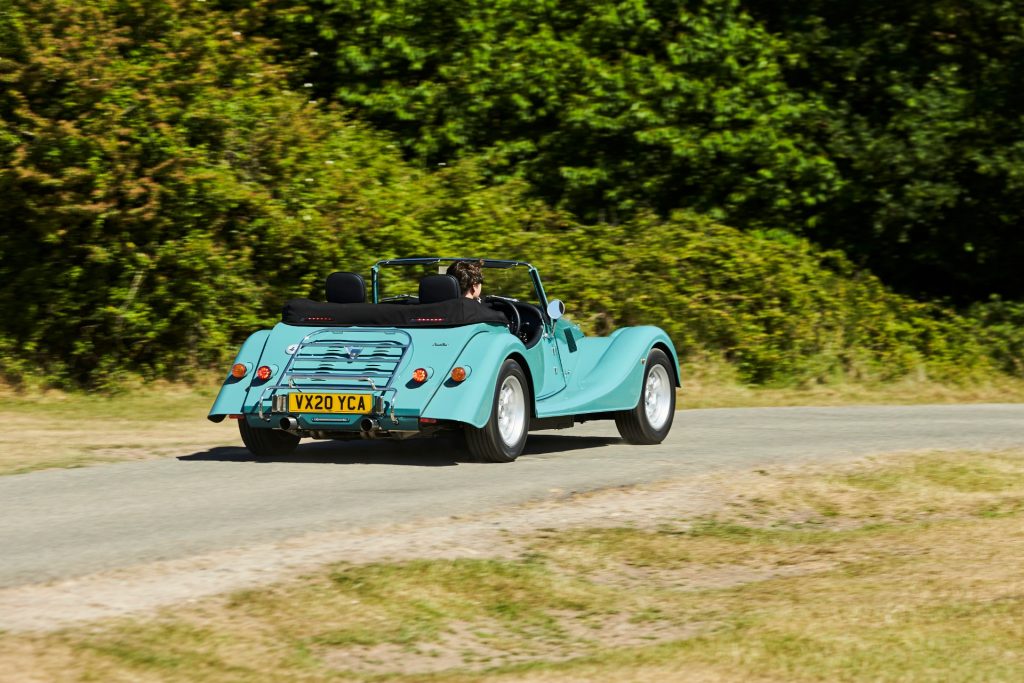
You can perk things up with a push of the Sport Plus button, and you can also option the eight-speed paddleshift auto, which I tried and liked very much. I’d take the manual as much for the experience as the fact the auto gear stick is a slightly jarring lift from BMW, but there’s no bad choice here.
There is, however, only one setting for the electric power steering, and while its ease and lightness recalls earlier Morgans, it initially feels too effortless to my palms, even in town. That feeling persists up in the picturesque Malvern Hills, where the steering swings the long nose quickly in to turns, but so quickly that I want more on-centre weight to lean on. There’s also a sense that the rear end lags a fraction behind your steering, like the owner of a tugging dog caught off-guard. Perhaps more rear roll stiffness would help.
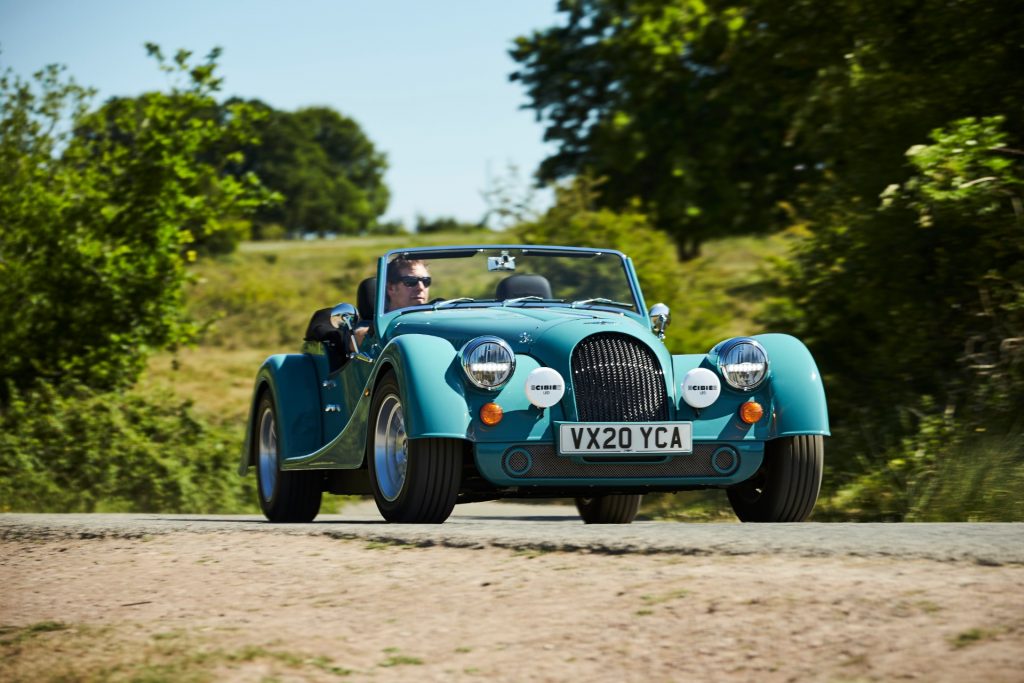
For a more sporting version that’s probably true, but Morgans are bought for touring and ride comfort as well as speed, and as miles whizz past, so I come to trust the Morgan’s handling and steering and those initial uncertainties fade. I work the chassis hard into a large roundabout and it behaves predictably and benignly and we’re soon into the virtuous circle of extra confidence helping me extract the best from a sports car that recalls the old days, drives like nothing else and yet doesn’t feel in the least bit antiquated.
For less money, you could buy mass market roadsters like the Jaguar F-Type and Porsche Boxster. Or how about an Alpine A110? Then there are the British companies such as Ariel and Caterham, both able to sell you something that’s as interesting as it is thrilling. But none is like the Morgan, and for that, we should be thankful. The Malvern-based car maker continues to have a place on our roads.
By the time I burble back to the Morgan factory gates, I’m really very taken by it, pondering just how far the company could push a Plus Four in terms of performance given its better sorted foundations.
So while even quite keen car spotters can’t tell the difference between Plus 4 and Plus Four from the kerb, from behind the wheel there’s no question this is a break with tradition of the best possible kind. And unlike that Land Rover Defender, it’d be a surprise if every Morgan customer, even deceased ones, didn’t wholeheartedly approve.
The numbers: Morgan Plus Four
ENGINE 2.0-litre four-cyl turbo,
POWER 255bhp @ 4400rpm,
TORQUE 295lb ft @ 1000-4300rpm
TRANSMISSION Six-speed manual, rear wheel drive
PERFORMANCE 5.2sec 0-62mph, 149mph, 39mpg, 165g/km
LENGTH/WIDTH/HEIGHT 3830/1650/1250mm
WEIGHT 1013kg (dry)

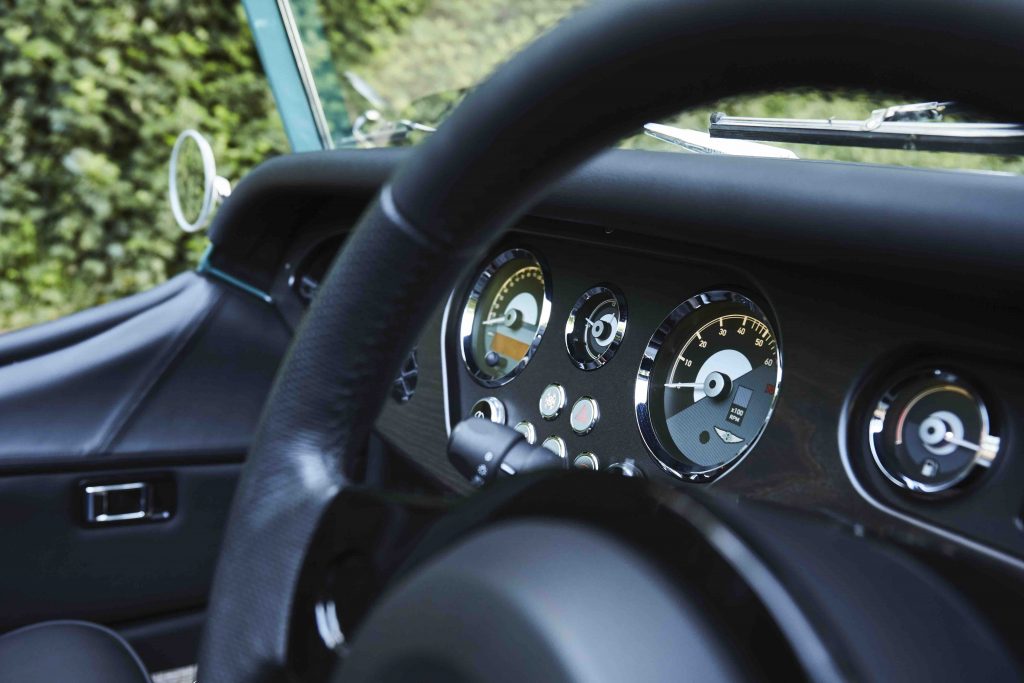
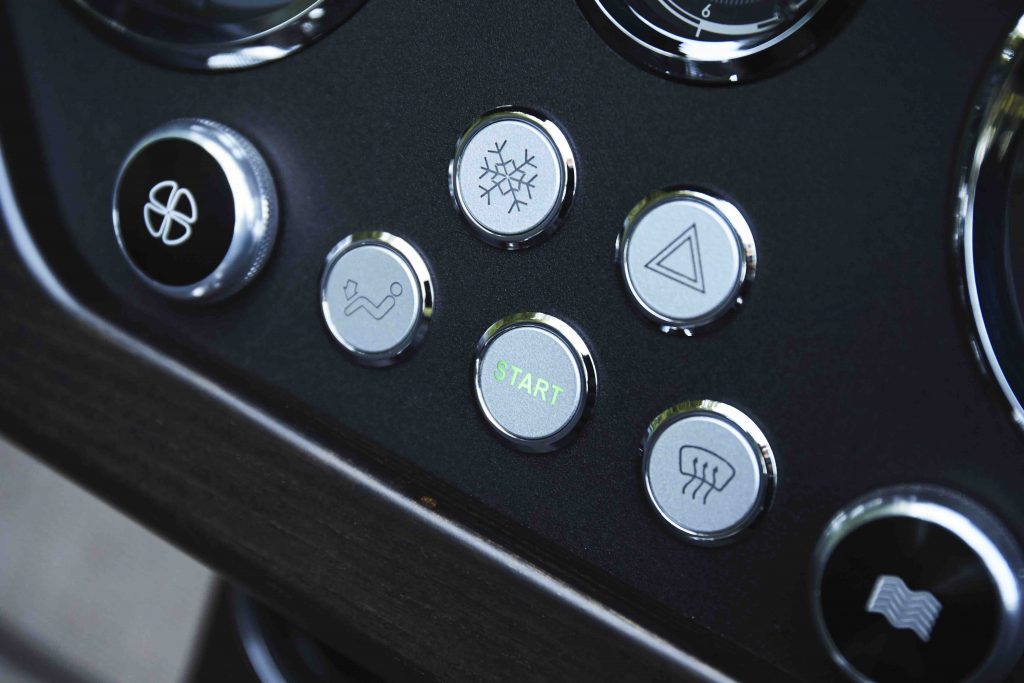
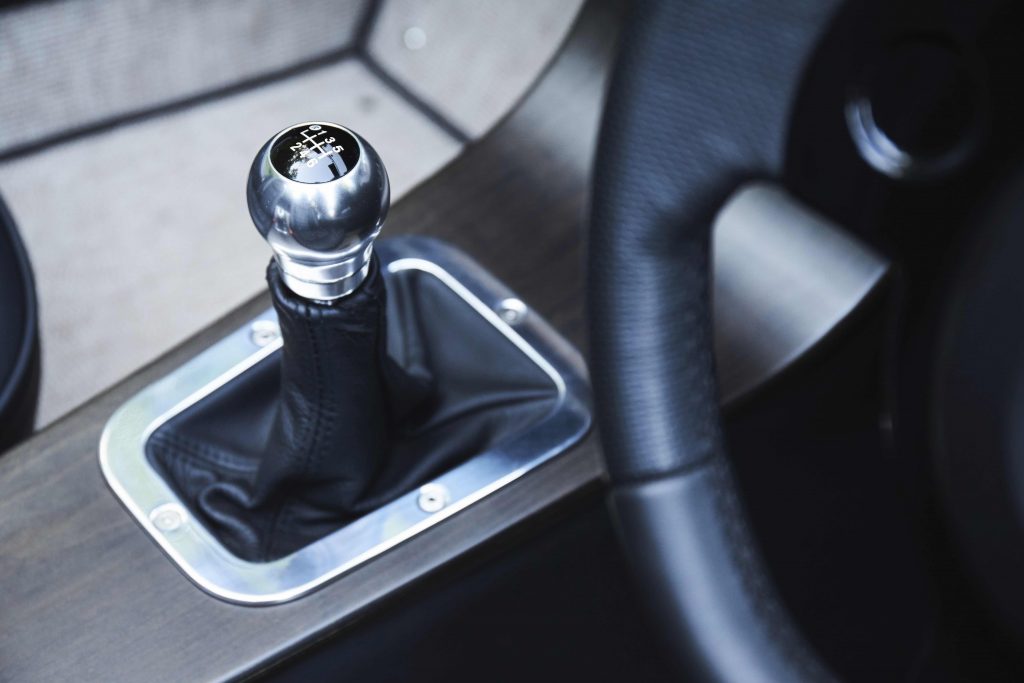
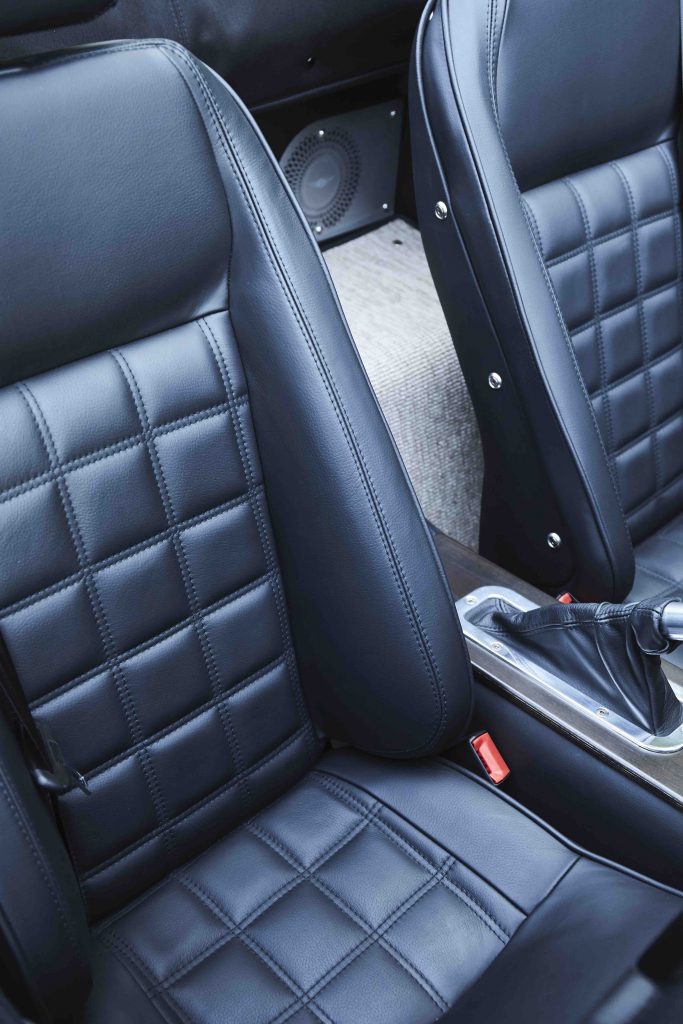

















I own a 78 plus eight & I wouldn’t trade it for this new four. Don’t like it without bumpers & this colour is horrible ! Mine is a two tone burgundy wings & champagne body the difference is amazing !
I constantly have to tell people that my Morgan is not a replicar. This new Plus Four IS a replicar.
Dan, Paul, I can’t speak for our author, Ben Barry, but personally I like that Morgan is moving forward, albeit in its own unique way.
I remember the controversy that the Aero 8 caused. I drove it at the launch, and even took one to Le Mans to follow Morgan as it attempted to qualify for a return to Le Mans in 2002, 40 years after Chris Lawrence drove the Plus 4 to a class win at the race. And I really warmed to the car and the way it drove thanks to the new generation of tech – even if I never warmed to the original headlamp arrangement.
And in the same way, the new Plus Four is progress. I like the colour simply because it isn’t BRG. In fact I like the sound of pretty much everything about it bar the price which means I’d have to save all the way to retirement – and then spend all my savings to afford one!
comment
comment
comment